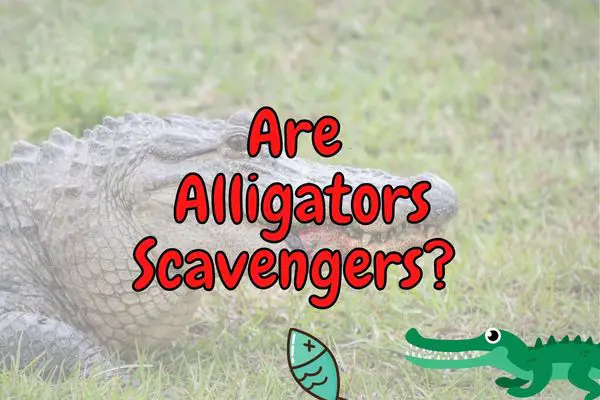Alligators are large carnivorous reptiles that live in freshwater environments, such as rivers and swamps. In the wild, alligators play an important role in the ecosystem as both predators and scavengers.
Alligators are opportunistic feeders and will eat anything they can catch. Their diet consists mostly of fish, but they also eat amphibians, reptiles, birds, and mammals. Alligators will even eat carrion if they find it.
While alligators primarily hunt during the day, they are also known to be active at night. When hunting, alligators use their powerful sense of smell to locate prey.
Once they have found their prey, they will lurk beneath the surface of the water until they are close enough to attack.
Alligators are important for the ecosystem because they are keystone predators and scavenger species.
They help to keep the population of their prey in check and help to maintain the wetland habitats that they live in.
They also prevent the build-up of dead animals that would otherwise be eaten by microorganisms, leading to the algae blooms in the waters around them.
Where do alligators live and what do they eat?
Adult alligators live in freshwater habitats such as swamps, marshes, rivers and lakes and warmer regions of the world. In the US, there are larger populations in an area stretching from North Carolina to Texas.
Alligators eat almost anything that they can catch or scavenge, including mammals, fish, insects, crustaceans, snails, birds, turtles, snakes and frogs.
They eat mostly aquatic vertebrates during the warmer months and switch to predominantly terrestrial prey during the cooler winter months.
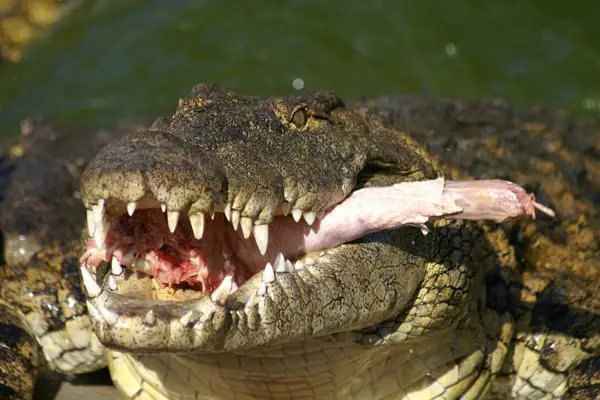
Alligators are opportunistic feeders that vary their prey selection based upon seasonal availability, abundance, size, nutritional content and predictability.
Alligators, like many other animals, will gorge themselves when food supplies are plentiful and they will easily eat more than 30% of their body weight in a single feeding!
Alligators eat animals larger than the alligator itself. The largest alligator on record, found in Louisiana, weighed 1,043 lb. and measured 14 ft. 4 in. long! So that is a big mouthful you might say…
Alligators remain submerged underwater for up to 20 minutes at a time, waiting for a prey animal to come near them. When an alligator senses a prey animal’s presence, the alligator will strike quickly. Alligators use their tail to propel themselves through the water as they chase and catch prey.
Are Alligators Decomposers or just Scavengers?
Alligators may be considered scavengers because they eat dead animals or carrion. However, bacteria in the gut of alligators may be considered decomposers.
Therefore, no alligator species are decomposers because decomposers are mainly bacteria and fungi.
A crucial difference between scavengers and decomposers is that scavengers simply break their food down into smaller pieces; they do not break them down into basic chemical nutrients, like decomposers do.
Are Alligators Carnivores, Herbivores or Omnivores?
Alligators are carnivores because they primarily eat animals. Alligators do not eat plants, fruits or vegetables.
They evolved from a long line of terrestrial lizards who, similarly, did not eat any plants. Even pet alligators will never eat plants.
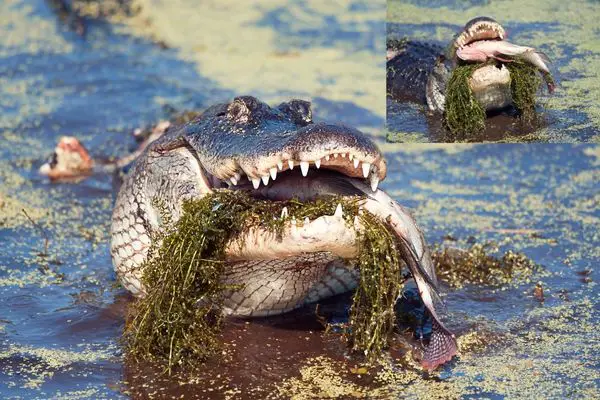
Sometimes, they may get plant matter in their gut because of the prey they hunt or because the prey has eaten plant matter, but this is consumed unintentionally.
Is an Alligator a Producer, Consumer or Decomposer?
Alligators are consumers because they eat other living things. Alligators are carnivores, which means that they eat other animals.
Only plants as well as some bacteria and protozoa are producers.
What Type of Consumer is an Alligator?
Alligators are predators because they hunt other animals for food. Generally, herbivores are primary consumers, omnivores secondary consumers and predators are tertiary consumers.
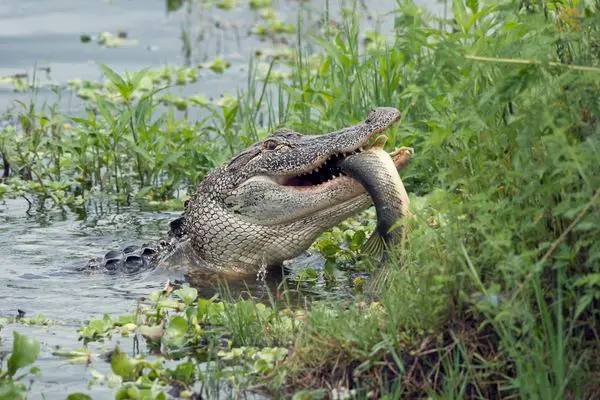
There are very few quaternary consumers in an ecosystem, mostly because a big portion of energy gets lost at each trophic level.
Most of the energy animals get from their food, gets lost as heat, and only a small portion is saved as biomass.
Are Alligators Autotrophs or Heterotrophs?
Alligators are heterotrophs because they eat other living organisms. Practically no animals are autotrophic because animals do not get their energy directly from the sun like plants do. That is, animals like the alligator cannot make their own energy!
Where are Alligators in the Food Chain?
As predators, alligators sit at the top of the food chain and are considered tertiary consumers or even quaternary consumers (apex predators!) depending on the environment they live in.
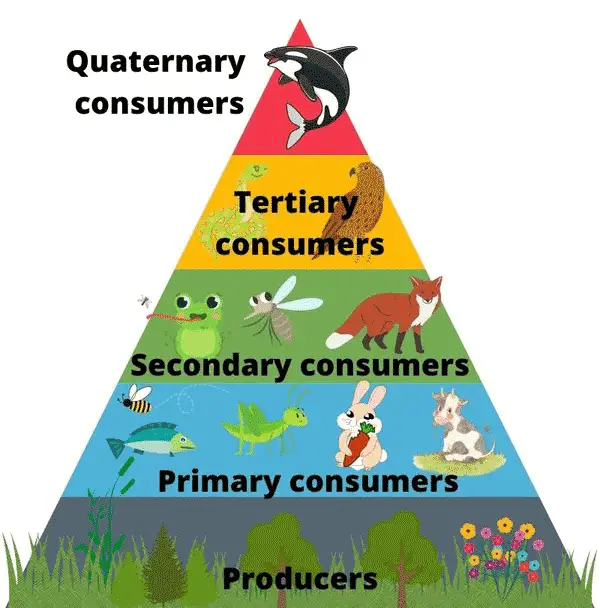
The vast majority of an alligator’s diet is composed of small mammals like rodents and birds, but they may also eat bigger animals such as other predators including their fellow species members!
When eating other alligators, snakes or frogs that themselves consume animals, they are considered tertiary consumers.
If they do not have any natural predators in their habitat, they would be apex predators of that niche in the food chain.
What Animals Hunt and Eat Alligators?
While alligators may be at the top of the food chain, they are not without their own predators.
Some of the most common predators of smaller alligators are hawks, cougars and raccoons, but only large birds like eagles, large snakes, hippos, or other alligators will hunt and eat adult alligators for food.
Humans, of course, also pose a large threat to alligators through hunting and habitat destruction.
Conclusion
In this blog post I have looked into the diet of alligators! Alligators are large carnivorous and scavenging reptiles that eat many different animals.
The habitat of alligators and other crocodilians (Alligators, Crocodiles, Caimans, and Gharials) have been under threat, and as a result, their numbers have declined in recent years.
Although alligators are quite opportunistic and will eat a range of animals, they are still an important part of the food chain.
Without alligators and other carnivores to keep populations in check, populations can run out of control, affecting other animal populations that cannot regulate their own numbers.
And as scavengers, they effectively clean up the aquatic ecosystems where they live!
I hope you have learned a bit more about alligators and other crocodilians, and why they are so important in ecosystems!

